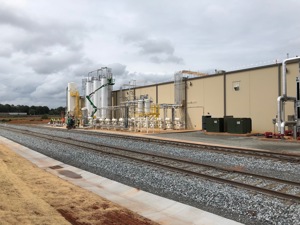Borealis starts up polypropylene compounding plant
Borealis and Borouge have announced that the new compounding plant of Borealis in Taylorsville, North Carolina, has come on stream during Q1 2019 as planned, with the inauguration of the facility scheduled for 16 May 2019.

With dedicated production lines for thermoplastic olefin (TPO) and short glass fibre (SGF) reinforced compounds, the plant is ideally located in the southeast of the United States to meet the growing needs of original equipment manufacturers (OEM) and Tier 1 customers in the region for advanced polypropylene (PP) solutions, while adding another 30 kt to Borealis and Borouge’s global PP compounding capacity. The 50,000 square foot facility, with rail siding in place, offers further expansion possibilities to meet the growing demand of customers.
“With the commercial and product development personnel well out of the starting blocks, our North American automotive team is set to drive the further growth of our automotive business in North America,” says Lucrèce Foufopolous, Executive Vice President Polyolefins and Innovation & Technology, Borealis. “Following the plant’s mechanical completion in December, first samples were shipped in February, and several projects with leading North American and European OEMs have already been secured.”
The new plant is an important addition to the global network of Borealis and Borouge’s established compounding plants in Europe, China
In line with the company’s strong commitment to automotive engineering, Borealis has also added an advanced new material to its low-density polypropylene portfolio for interior applications, Daplen™ EE058AI. “The 10 percent talcum filled and elastomer-modified high-purity grade is designed to meet the latest OEM requirements for automotive interior applications with low odor, emission
The innovative new Daplen EE058AI grade targets global approvals
“We have successfully been using existing Daplen products in similar components before, but the new EE058AI grade offers unprecedented weight savings of up to 6.5 percent without compromising performance, which helps us lower our carbon footprint to meet committed fleet emission levels,” adds Luděk Bělka, Coordinator Development Dashboard for ŠKODA. Borealis Daplen and Fibremod long glass
The lower dashboard, glove box and center console of the new ŠKODA SCALA are molded in Daplen™ EE058AI, a low density 10 percent talcum filled and elastomer modified polypropylene compound from Borealis, enabling weight savings of 6.5 percent over the previous 20 percent talc solution.
Borealis’ new PP compounding plant at Taylorsville, North Carolina, adds 30 kt to the company’s global production capacity for automotive thermoplastic olefin and short glass fiber reinforced material grades.






Comments